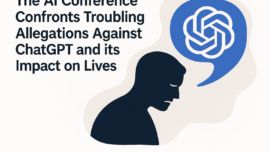
In an ever-evolving landscape dominated by artificial intelligence, the recent AI Conference uncovered serious allegations against OpenAI’s ChatGPT, revealing troubling impacts on journalism and individual lives alike.
Short Summary:
- OpenAI faces lawsuits from non-profits and authors over potential copyright infringements.
- Journalistic integrity is at stake as AI-generated summaries may threaten the viability of media outlets.
- The debate about AI ethics and copyright highlights significant challenges and impacts on creators across industries.
On October 3, 2023, the AI Conference attracted attention as accusations against OpenAI’s ChatGPT sparked stirring discussions about copyright infringement, journalistic integrity, and the ethical implications surrounding artificial intelligence. The conference, which gathered academics, journalists, and technology leaders, addressed the potential hazards of AI systems, particularly in the context of their effects on real lives, especially those of journalists and content creators.
The recent legal proceedings initiated by the nonprofit organization, the Center for Investigative Reporting (CIR), have sent shockwaves through the industry. The CIR claims that OpenAI and its partner Microsoft have utilized their copyrighted content without permission to train AI models, such as ChatGPT, fundamentally violating copyright laws. According to a report by Associated Press, the CIR stated in the lawsuit that OpenAI’s business model is “built on the exploitation of copyrighted works,” presenting numerous challenges to publishers who depend on revenue from their original content.
“It’s immensely dangerous,” stated Monika Bauerlein, the CEO of CIR, further emphasizing, “Our existence relies on users finding our work valuable and deciding to support it.”
OpenAI’s alleged misappropriation of content raises crucial concerns about how AI-generated summaries and texts can directly affect publishers’ bottom lines. The lawsuit cites instances where ChatGPT summaries failed to include essential citation information such as the original author’s name or the title of the work. This has left many organizations worried that their intellectual property may be under threat, further diminishing revenues and the viability of investigative journalism in an era already fraught with challenges for media outlets.
In the current legal climate, OpenAI finds itself facing multiple lawsuits. Alongside the CIR case, notable media outlets, including The New York Times, and bestselling authors like John Grisham and Jodi Picoult, are voicing their concerns about similar copyright violations. Amid escalating tensions, some organizations have opted to form partnerships with OpenAI, seeking compensation in exchange for allowing the use of their valuable content for AI training. Recently, Time Magazine announced a deal allowing OpenAI access to their archives that span over a century, yet many remain skeptical about whether these cooperative approaches can provide adequate protections.
“When people can no longer develop that relationship with our work, then their relationship is with the AI tool,” said Bauerlein, indicating the wider implications of this technology on media consumption and audience engagement.
OpenAI’s response to these controversial allegations remained relatively muted, with their spokesperson declaring a commitment to work collaboratively with the news industry, stating:
“We are working collaboratively with the news industry and partnering with global news publishers to display their content in our products…to drive traffic back to the original articles.”
This position satisfies no one, particularly as major media entities foresee a worrying trend: AI models exploiting their intellectual contributions without fair compensation. Hostility towards OpenAI’s practices only mounted as attendees debated the fundamental tenets of digital ethics and copyright in a rapidly changing technological landscape. Advocates for AI accountability stressed the urgency of setting clear boundaries regarding intellectual property rights, especially in scenarios where creators and artists fear losing control over their work.
Beyond copyright concerns, the AI Conference also spotlighted the broader implications of AI misuse on professional lives. The enterprise of writing and journalism could become increasingly homogenized in a world where AI tools dominate and dictate content creation. Just like OpenAI’s models such as ChatGPT, the technology they produce could possibly sideline the more nuanced understandings and conversations that human creators engage in—thus diminishing the diversity of thought and artistic expression.
Academic integrity and critical expressions of originality are defined by our ability to bring fresh perspectives, yet conflicts with AI may lead to moral dilemmas surrounding originality and plagiarism. The growing reliance on AI tools could raise questions about whether AI-generated outputs—even those that merit recognition and publication—truly reflect individual authorship or merely mimic existing texts from vast databases. This concern is particularly poignant given the rapid proliferation of AI-generated works, made possible by training regimens that capitalize on the vast repositories of online knowledge.
As established by the ensuing dialogue at the conference, many believe it’s time for industry leaders to address the risks posed by AI content generation. Simple governance measures like improved transparency in training datasets, as well as recognizing the contributions of human writers, could help foster environments where AI works *with* rather than *instead of* creative professionals.
Thomas Smith, an emerging voice in the tech industry, assertively stated:
“We are at the crossroads of creativity and technology; it is essential that we do not allow AI to overshadow the very humans who drive our narratives. The future of journalism relies on collaboration, not colonization.”
As discussions came to a close at the AI Conference, it became abundantly clear that the road ahead necessitates a good understanding of the ethical responsibilities associated with these emerging digital tools. Creatives and technologists alike must rally around building systems that respect copyright, promote diversity, and cultivate fair ecosystems that reward innovative contributions.
As Autoblogging.ai continues to pursue technological advancements in AI-generated content, it challenges the industry to embrace responsible AI practices that allow for collaboration between machines and humans. By doing so, we may explore a promising future where creativity flourishes alongside innovative technology, rather than diminished by it.
Do you need SEO Optimized AI Articles?
Autoblogging.ai is built by SEOs, for SEOs!
Get 30 article credits!

